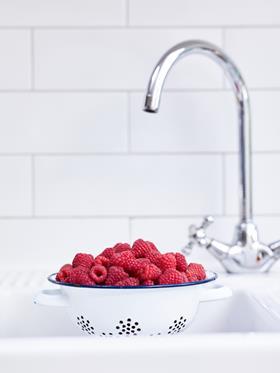
With Wimbledon wrapped up for another year, the soft-fruit sector has entered a peak sales period, and continuing growth in the category is showing few signs of letting up.
Overall value sales increased by 7.7 per cent in the 52 weeks to 18 June 2017, with volumes up 2.5 per cent, according to Kantar data. The main driver for this, according to soft-fruit supplier Berry Gardens, is the trend for healthy snacking.
“Recent focus group consumers are telling us they are making a conscious decision to snack on berries rather than less healthy alternatives,” says new CEO Jacqui Green. “As a company we are looking at several work streams to support demand, including secondary sites using a refrigerated unit called a Coolio, as well as different pack formats and the ‘lunch on the go’ in-store offers.” This drive to promote healthy snacking is also supported by a Berry Gardens PR campaign to encourage consumers to swap berries for biscuits in the workplace.
Despite the optimism that this brings, major concerns persist on the Brexit issue of seasonal labour, with a recent NFU survey of labour providers showing that the number of seasonal workers coming to work on British farms has dropped 17 per cent in the first five months of 2017. A separate report, published by business consultancy Andersons, has warned that the price of soft fruit could skyrocket if the government doesn’t take action to address an impending labour crisis.
The other factor driving up berry prices is currency volatility, with the post-referendum fall of the pound gradually increasing berry prices per kilo over the past year. The devaluation of the pound, combined with the introduction of the National Living Wage, is making it increasingly difficult for growers to stay profitable, warns BerryWorld’s Charlotte Knowles, but she says suppliers are helping growers invest in new varieties that are easier to pick.
The stars of the soft-fruit category at the moment are raspberries and blueberries, with the two berries posting value sales growth of 13.2 per cent and 12.4 per cent respectively in the year to 21 May, according to BerryWorld. Both fruits have benefited from an increase in penetration and frequency of purchase, Knowles points out, and the number of usage occasions is also expanding. In blueberries in particular sales growth has been aided by successful PR campaigns focusing on the product’s health benefits, according to David Buxcey of Angus Soft Fruits.
Another product on the rise is blackberries, sales of which have grown faster than those of any other soft fruit – albeit from a smaller base, with blackberries only accounting for three per cent of total berry sales. The increased availability of sweet varieties, such as Driscoll’s Victoria, is helping to boost frequency of purchase, and this has encouraged Berry Gardens to invest in glasshouse production and increased planting. Wider growth in the category is being aided by a move away from multibuy promotions and towards EDLP price points, according to BerryWorld. And although this shift has reduced volumes by 4.5 per cent year on year, it has also resulted in an overall spend increase at retailers.
Another significant trend is the polarisation of the market, with a gap emerging between standard and top-tier produce. “The £2 price point has now become ubiquitous with berries,” says Knowles, “and the launch of farm brands and premium tiering have both been game changers.” When Tesco began selling berries under its Rosedene brand, punnet prices fell below the £2 mark, helping to drive year-on-year penetration gains of 3.6 per cent, according to Kantar.



